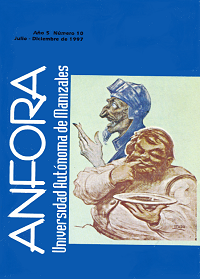Lectura critica: O como defenderse de la dictadura de la información
Main Article Content
Abstract
En el ámbito educativo colombiano, los cursos de comprensión de lectura tanto en lengua española como en lengua extranjera, han privilegiado el estudio de la gramática, el análisis discursivo o la adquisición de información por parte del lector. De aquí que la capacidad del lector para evaluar, analizar, tomar posición y hacer juicios sobre los contenidos de lectura no se haya desarrollado de manera efectiva. El propósito de esta conferencia es presentar una visión de LECTURA CRITICA (LC) a partir de una experiencia pedagógica vivida en el Centro de Idiomas Extranjeros de la Universidad Nacional de Colombia entre 1993 y 1997. Se propone un modelo de Lectura Crítica que puede ser útil en la evaluación y análisis de las ideas contenidas en cualquier tipo de texto. Las actividades pedagógicas derivadas del modelo pueden ser aplicadas además a la lectura de cualquiera de los mensajes que aparecen en los medios masivos de comunicación.
How to Cite
Downloads
Metrics
Article Details
Bernstain, B. (1971) Class. Codes and Control, Vol1: Theoretical Studies towards a Sociology of Knowledge. London: Routledge & Kegan Paul. 202-230.
Carrel, P. and J. C Eísterhold (1983) Schema theory and ESL Reading Pedagogy. TESOL Quarterly 17(4).
Fransson, A (1984) Crarnmiog or understanding? Offects of intrinsic and extrinsic motivation on approach to learning and test performance. In C. Alderson and A. Urquhart(eds) (1984) Reading in a Foreing Language. London: Longman.
*Freire, P (1973) Education for Critical Consciousness. London: Sheed and Ward.
*Foucault, M. (977) the Archaeology of Knowledge. London: Tavistock Publications.
Harris, T. L., & R. E Hodges (J 981) A dictionary of reading and related terms. Newark, DE: lnternational Reading Association.
Kehl, D. G. (1983) How 10 Read an Ad: Learning to Read Between the Líes. English Journal 72/6.
*Littlejohn, A and S. Winteatt. (1989) Beyond language learning: Perspectives on Materials
Design. In R. K Johnson (ed) The Second Language Curriculum.
Mc Cabe, P. (1984) Reading Critically: A survival Skill. Reading World 24/2.
Patching, W. (1983) Direct lnstruction in Critical Reading Skills. Reading Research Quarterly 18/4 406-418.
Paul, R. W. Binker, A. J. A., Adarnson, K., & Martín, D. (1989). Glossary: An educator's guide to critical thinking terms and concepts. The Ninth Anual & Seventh lnternational Conference on Critical Thinking and Educational Reform. Rohnert Park, CA: Center for Critical Thinking & Moral Critique, Sonoma State University.
Robinson, H.M (1966) Developing Critical Reading, In J. Downing (00) The First International Reading Svmposium. London: Casell, 249-261.
Rumelhart., D. E (1980) Schemata The building blocks of cognition. In R. J. Spiro, B. C Bruce, & W F. Brewer (edis). Theoretical issues ín reading comprehension. Hillsdale, NJ: Erlbaum.
Scholes, R. (1985) Textual Power. New Haven, Conn.: Yake University Press.
Scott, M. R. (1986) The Understanding to Direct Conscientizacao and Reading. Working Papers of Brazil ESP Project. No. 18, Sao Paulo: CEPRIL.
Scott, M. R, Alves de Oliveira, Nadia, Días, Reinildes & Pimienta, Sonia M de Oliveira, (l988) Teaching critical Reading Through Set Theory. Working Papers of Brazil ESP Project No. 20, Sao Paoulo: CEPRlL.
Scott, M. R. (1988) Critical Reading Needn't Be left Out. The ESP Journal 9/1-2.
Taylor, W M. (1987) Political Science 202: International Relations. Writing Assignments.
Illinois.
Widdowson, H. G. (1984) Reading and Communication In C. Alderson and A. Urquhart
(eds) (1984) Reading in a Foreign Language London: Longman.
Once the manuscript is approved, the authors should file and sign the Right Transfer Format.












